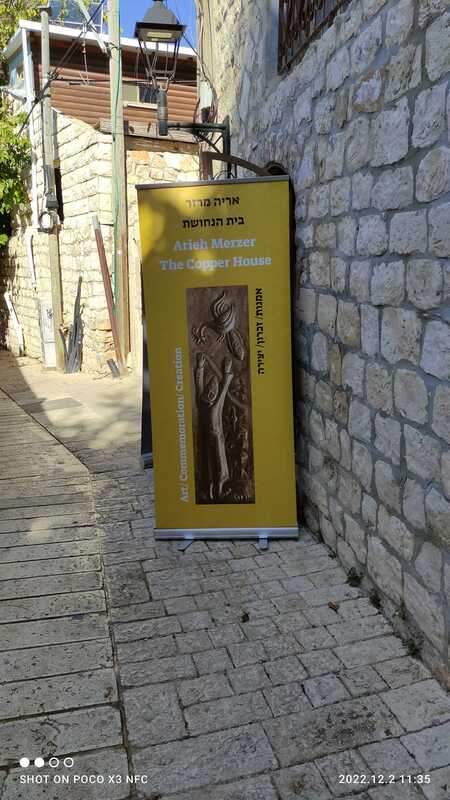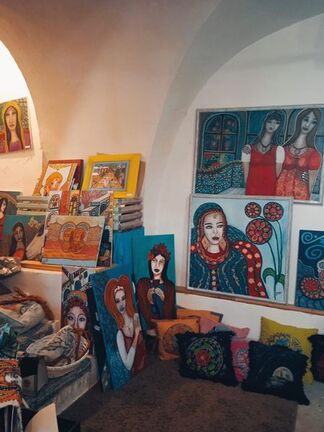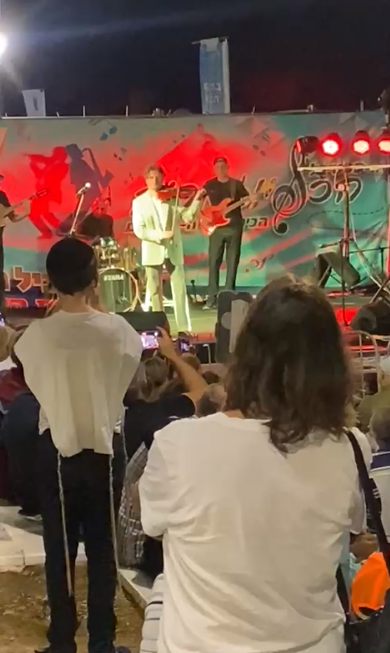Opening of Merzer Gallery

December 22, 2022, Susan Cohen, Managing Editor
Nestled in the corner of Rechov Yet Vav, the newly renovated Merzer Gallery boosts the Artists Colony revival movement underway since last summer.
The Artists Quarter Minyan and Yonit Tayar's popular Todayah Gallery head the street, and there are at least 8 working artists up to Maayan HaRadum. The neighborhood is taking on new life and Yonatan Darmon's Etz Ha Toot Cafe next to Masha's Gallery has opened opposite Magamat Music Center now offers a food option for the neighborhood.
While the future is bright for the neighborhood, there are challenges. To date, no garbage receptacles, no traffic and parking rules, and enforcement, and the big lock on Gan Ziffer signal have long been neglected by the municipality.
Not to be discouraged, artists and community members are enthusiastic and devoted to restoring the historic past for new times.
Nestled in the corner of Rechov Yet Vav, the newly renovated Merzer Gallery boosts the Artists Colony revival movement underway since last summer.
The Artists Quarter Minyan and Yonit Tayar's popular Todayah Gallery head the street, and there are at least 8 working artists up to Maayan HaRadum. The neighborhood is taking on new life and Yonatan Darmon's Etz Ha Toot Cafe next to Masha's Gallery has opened opposite Magamat Music Center now offers a food option for the neighborhood.
While the future is bright for the neighborhood, there are challenges. To date, no garbage receptacles, no traffic and parking rules, and enforcement, and the big lock on Gan Ziffer signal have long been neglected by the municipality.
Not to be discouraged, artists and community members are enthusiastic and devoted to restoring the historic past for new times.
Todaya Gallery

August 18 2022
Susan Cohen, Managing Editor
The citizen-driven revitalization of the Artists Colony has been energized by the addition of prolific multi-media artist Yonit Tayar.
Tucked on Rechov Tet Vav by Ziffer Garden, her home/studio is a must-see stop for visitors and locals alike.
Whether you're 4 or 90, her unique teaching style is sure to give you and yours a memorable experience. Stop by between 10 and 6.
Classes daily.
Todayah Gallery
64 Rechov Tet Vav
(opposite Artists Quarter Minyan)
053-528-6922
Susan Cohen, Managing Editor
The citizen-driven revitalization of the Artists Colony has been energized by the addition of prolific multi-media artist Yonit Tayar.
Tucked on Rechov Tet Vav by Ziffer Garden, her home/studio is a must-see stop for visitors and locals alike.
Whether you're 4 or 90, her unique teaching style is sure to give you and yours a memorable experience. Stop by between 10 and 6.
Classes daily.
Todayah Gallery
64 Rechov Tet Vav
(opposite Artists Quarter Minyan)
053-528-6922
Klezmer Festival: At 35, is it Still Good for the City?

by Susan Cohen, Managing Editor
Klezmer is in town, and while the municipality is touting its great success, the benefits to residents are minimal and the headaches massive.
The tzimmers are full and the handful of restaurants are doing a brisk business. But the rest of the city not only is not benefitting from the influx of visitors, residents and small businesses are frustrated and inconvenienced.
Traffic and parking, already a huge challenge, is unbearable. Cars are on sidewalks and busses are idling on narrow streets and parking illegally.
If the city ever had a master traffic and parking plan, it was ill-conceived. Narrow streets barely wide enough for a single lane allow two-way traffic and parking on both sides of the street.
It took years to complete the renovation of Keren Hayesod. A main artery that connects the city is narrow and allows two way traffic until the Old City, when without signage it becomes one way without a turn around option. Busses, trucks and vans hold up traffic routinely, and there have been at least four fender benders since yesterday. People are stuck at home because there is no permit parking for residents.
There are similar situations throughout the city which are seriously problematic without thousands of additional cars and confused drivers honking horns and screaming obscenities in several languages. Compound that with the neon- vested security forces ill-equipped and unwilling to attempt to control the situation and we are a city in chaos.
While the reasons for the non- completion of Kikar Sade are unknown to the public, what should have been a main stage filtering guests to other parts of the city- including the artists alley, the Old City and struggling local businesses, stages are now shoved into small spaces on a depressing and filthy Jerusalem Street- ignored during Covid, which was the ideal time for badly needed renovation. Empty storefronts line the Midrachov offering only pizza and falafel. Merchandise of no interest to visitors line both sides of the narrow sidewalks making it impossible for more than single pedestrians without carriages and shopping carts to pass. While an attempt to clean the streets was made in recent days, with no trash receptacles, litter fills the street immediately. The unnecessary work on the new plaza next to the Iriya has little seating, no refuse bins, and eliminated a dozen desperately needed parking spaces.
In a city touted as a center of art, none of the talented struggling artists were invited to participate. The lazy, unimaginative posters and publicity were an ideal opportunity to showcase the city's amazing pool of creativity. The constant carousel of changing roundabouts features no local art, nor is any displayed on the walls of municipal buildings. Our local, world class musicians were shut out of performing with claims of no financial resources. There is no city map and no tourist center.
Nothing more than an inclusive, creative music and art festival would bring our holy city back from the ravages of Covid. The city had a golden opportunity to polish the diamond that is Tzfat.
They fell terribly short.
Klezmer is in town, and while the municipality is touting its great success, the benefits to residents are minimal and the headaches massive.
The tzimmers are full and the handful of restaurants are doing a brisk business. But the rest of the city not only is not benefitting from the influx of visitors, residents and small businesses are frustrated and inconvenienced.
Traffic and parking, already a huge challenge, is unbearable. Cars are on sidewalks and busses are idling on narrow streets and parking illegally.
If the city ever had a master traffic and parking plan, it was ill-conceived. Narrow streets barely wide enough for a single lane allow two-way traffic and parking on both sides of the street.
It took years to complete the renovation of Keren Hayesod. A main artery that connects the city is narrow and allows two way traffic until the Old City, when without signage it becomes one way without a turn around option. Busses, trucks and vans hold up traffic routinely, and there have been at least four fender benders since yesterday. People are stuck at home because there is no permit parking for residents.
There are similar situations throughout the city which are seriously problematic without thousands of additional cars and confused drivers honking horns and screaming obscenities in several languages. Compound that with the neon- vested security forces ill-equipped and unwilling to attempt to control the situation and we are a city in chaos.
While the reasons for the non- completion of Kikar Sade are unknown to the public, what should have been a main stage filtering guests to other parts of the city- including the artists alley, the Old City and struggling local businesses, stages are now shoved into small spaces on a depressing and filthy Jerusalem Street- ignored during Covid, which was the ideal time for badly needed renovation. Empty storefronts line the Midrachov offering only pizza and falafel. Merchandise of no interest to visitors line both sides of the narrow sidewalks making it impossible for more than single pedestrians without carriages and shopping carts to pass. While an attempt to clean the streets was made in recent days, with no trash receptacles, litter fills the street immediately. The unnecessary work on the new plaza next to the Iriya has little seating, no refuse bins, and eliminated a dozen desperately needed parking spaces.
In a city touted as a center of art, none of the talented struggling artists were invited to participate. The lazy, unimaginative posters and publicity were an ideal opportunity to showcase the city's amazing pool of creativity. The constant carousel of changing roundabouts features no local art, nor is any displayed on the walls of municipal buildings. Our local, world class musicians were shut out of performing with claims of no financial resources. There is no city map and no tourist center.
Nothing more than an inclusive, creative music and art festival would bring our holy city back from the ravages of Covid. The city had a golden opportunity to polish the diamond that is Tzfat.
They fell terribly short.
ARTISTS QUARTER MINYAN ACQUIRES SEFER TORAH: Dream Comes True for Two Families June 26 2022

by Susan Cohen
Managing Editor
What was a youthful friendship and a shared dream came to fruition this week when the Artists Quarter Minyan celebrated the homecoming of its first sefer torah.
The momentous event began at Machon Alte, the prestigious women’s learning center founded by Rabbi Yosef and Rochel Leah Rosenfeld. AQM’s Rabbi Zalman and Chana Traxler, sponsor Tomer Benshushan and his family, Chief Ashkenazic Rabbi of Tzfat Rabbi Mordechai Bistritzky, Dr. Shmuel Yosef Weiss, and a host of esteemed guests led the way for an emotional stream of shul members and guests eager to have a hand in the momentous occassion.
Zalman grew up in Houston, the son of longtime shluchim Rabbi Moshe and Shoshana Traxler. Basya Grinshtein, daughter of another Chabad stalwart family, had been his classmate since elementary school, and they stayed in close touch. When Basya married Israeli Tomer Benshushan, the bond was strengthened. Tomer had long wanted to dedicate a torah in memory of his father, and had promised it would be placed wherever the Traxlers established a shul.
It took the Artists Quarter Minyan four years to find a permanent home. Minyanim were held in a half dozen locations before the acquisition of the former Shaarei Bina building over a year ago. A burgeoning congregation quickly outrew the space, and with a generous donation from another Houstonite, the Dr. Shmuel Yosef Weiss Center for Jewish Life opened in the magnificent building known as Bayit Tet Vav on Shavuot, 2021. It became the epicenter of spiritual and social life for the growing Anglo community and it’s production of successful community wide events and chesed projects grew.
The AQM had a permanent home, but the Sifrei Torah were borrowed. Tomer and Basya had already commissioned the scroll from a sofer friend in South Africa, but Covid made its’ delivery extremely difficult. Congregant Miriam Gibor, who managed a visit to her family, hand carried the scroll home to Tzfat.
It took almost two years from the commission of the Torah until its arrival. Covid and travel restrictions delayed the dedication until this week.
The large, exhuberant crowd was jubilant and emotional, particularly for Rabbi Traxler. As the procession passed Kikar Sade, he was overcome by the memory of five years earlier, when he spent his days putting on tefillin with visitors on the same spot.
The day long festivities, which culminated in a lavish, music and dance-filled seudah, was cause for reflection on what the AQM means not only to the congregation, but to Tzfat as a whole. The Traxlers are known for their generous hospitality, and the beautifully decorated space, lovingly created by AQM friend Tirtza Meirav reflected their intent to always share the abundance with everyone.ivka
For Chana Traxler, whose parents Rabbi Meir Chai and Rivka Benhiyoun were here from Chicago, it was like giving birth twice in a month. The Traxlers welcomed a son two weeks ago, and was enthusiastically enjoyed by shul members and a host of prestigious guests, including Rabbanit Tova Eliyahu, distinguished rabbis and extended Benshushan family.
Donated by the Benshushan family and and lovingly dedicated in memory of Moshe Meir Ben Maimon and Jeanette Benshushan, tomorrow marks the first Shabbat with AQM’s own Torah. It will be the scene of yet another simcha- the ufroof of Shlomo Lebowitz.
“ We have an amazing community,” says Chana Traxler. “We daven together every Shabbos and share our day-to-day life. This kehilla basks in the light of Hashem, and this Sefer Torah is our trophy.”
Managing Editor
What was a youthful friendship and a shared dream came to fruition this week when the Artists Quarter Minyan celebrated the homecoming of its first sefer torah.
The momentous event began at Machon Alte, the prestigious women’s learning center founded by Rabbi Yosef and Rochel Leah Rosenfeld. AQM’s Rabbi Zalman and Chana Traxler, sponsor Tomer Benshushan and his family, Chief Ashkenazic Rabbi of Tzfat Rabbi Mordechai Bistritzky, Dr. Shmuel Yosef Weiss, and a host of esteemed guests led the way for an emotional stream of shul members and guests eager to have a hand in the momentous occassion.
Zalman grew up in Houston, the son of longtime shluchim Rabbi Moshe and Shoshana Traxler. Basya Grinshtein, daughter of another Chabad stalwart family, had been his classmate since elementary school, and they stayed in close touch. When Basya married Israeli Tomer Benshushan, the bond was strengthened. Tomer had long wanted to dedicate a torah in memory of his father, and had promised it would be placed wherever the Traxlers established a shul.
It took the Artists Quarter Minyan four years to find a permanent home. Minyanim were held in a half dozen locations before the acquisition of the former Shaarei Bina building over a year ago. A burgeoning congregation quickly outrew the space, and with a generous donation from another Houstonite, the Dr. Shmuel Yosef Weiss Center for Jewish Life opened in the magnificent building known as Bayit Tet Vav on Shavuot, 2021. It became the epicenter of spiritual and social life for the growing Anglo community and it’s production of successful community wide events and chesed projects grew.
The AQM had a permanent home, but the Sifrei Torah were borrowed. Tomer and Basya had already commissioned the scroll from a sofer friend in South Africa, but Covid made its’ delivery extremely difficult. Congregant Miriam Gibor, who managed a visit to her family, hand carried the scroll home to Tzfat.
It took almost two years from the commission of the Torah until its arrival. Covid and travel restrictions delayed the dedication until this week.
The large, exhuberant crowd was jubilant and emotional, particularly for Rabbi Traxler. As the procession passed Kikar Sade, he was overcome by the memory of five years earlier, when he spent his days putting on tefillin with visitors on the same spot.
The day long festivities, which culminated in a lavish, music and dance-filled seudah, was cause for reflection on what the AQM means not only to the congregation, but to Tzfat as a whole. The Traxlers are known for their generous hospitality, and the beautifully decorated space, lovingly created by AQM friend Tirtza Meirav reflected their intent to always share the abundance with everyone.ivka
For Chana Traxler, whose parents Rabbi Meir Chai and Rivka Benhiyoun were here from Chicago, it was like giving birth twice in a month. The Traxlers welcomed a son two weeks ago, and was enthusiastically enjoyed by shul members and a host of prestigious guests, including Rabbanit Tova Eliyahu, distinguished rabbis and extended Benshushan family.
Donated by the Benshushan family and and lovingly dedicated in memory of Moshe Meir Ben Maimon and Jeanette Benshushan, tomorrow marks the first Shabbat with AQM’s own Torah. It will be the scene of yet another simcha- the ufroof of Shlomo Lebowitz.
“ We have an amazing community,” says Chana Traxler. “We daven together every Shabbos and share our day-to-day life. This kehilla basks in the light of Hashem, and this Sefer Torah is our trophy.”
Tambourine Dream Festival -- Making Dreams Come True June 12 2022

By
Susan Cohen
It was Aviva Spiegel's longing to spend time at the beach that was the impetus for the Tambourine Dream Festival.
Ten years ago, married, with six young children at home, she yearned to be seaside occasionally to rejuvenate her physically and spiritually. Inspired by a talk of the Lubavitcher Rebbe urging women to begin celebrating the Redemption not only through learning and prayer but with music and dance, an idea gave birth to one of the most anticipated women’s celebrations of the year.
A Stanford University graduate and veteran of years of shlichut in both the United States and Israel, activism and organization had become second nature to her. On her arrival in Tzfat, she quickly connected with the women already creating events and initiated creative celebrations for Chanukah and Purim. With her pre-Teshuva experiences of beach parties and Grateful Dead concerts, she conjured a plan to produce a beach side celebration for women encompassing an atmosphere of Torah, music and dance.
With no sponsor or capitol, Aviva was confident that ticket sales would cover the costs of the beach rental, musicians and promotion. She signed on some of Israel's most prolific female musicians- Tziona Achishena, Chava Rochel Saban and Michal Shababo- and secured a location on the Kinneret.
It's been nine years and the dream is flourishing. Women from all walks of life- singles, married and lots of mommies toting their offspring and camping gear, gather beach side for three days of Torah, music and inspiration. This year's celebration brings longtime participants and a host of newcomers eager to join the festivities.
For Tzipporah Modes, it is a welcome respite from daily life. "Last year was the hardest of my life. I had an extremely difficult pregnancy, and could not walk for three months after the birth. I was in a very low place physically, emotionally and spiritually. Without exaggerating at all, the festival changed my life. I was finally able to open up and feel free to be me and totally connected to Hashem."
Bonding with other women and attention to self care is a vital component of the festival philosophy. Says community activist Meira Roome, "The first time I came to the Tambourine Festival, I had three children under three and my husband was serving in the IDF. To say I needed some self care is a huge understatement. My neighbor told me about it and I decided to go with her for a day. I was immediately hooked, addicted to the laughter, the feminine achdus, the Torah classes- even the swimming was uplifting. I was experiencing my own personal geula, and it repeatedly brought me to joyful tears. I have gone every year since, and eventually became involved in the festival's organizational operations."
For Aviva, whose eternal optimism and fearlessness for challenge and hard work is boundless, with Covid restrictions lifted, this year's festivities will be particularly joyful.
"Over the years, as I've internalized more the teachings of Chassidus, the kavanna of the festival has transformed to also reflect a very specific goal- to "birth Geula". The driving force behind the festival is to provide an atmosphere of joy, love and support for women to actually experience levels of quantum healing and revelation of personal truth. I'm addicted to those moments at the festival- during the improvisational dance circle jams, when I get it with my whole being that we're already birthing the Geula. Where will you be and what will you be doing when you experience
that quantum shift in your reality? Step into the Circle- we're ready!
Susan Cohen
It was Aviva Spiegel's longing to spend time at the beach that was the impetus for the Tambourine Dream Festival.
Ten years ago, married, with six young children at home, she yearned to be seaside occasionally to rejuvenate her physically and spiritually. Inspired by a talk of the Lubavitcher Rebbe urging women to begin celebrating the Redemption not only through learning and prayer but with music and dance, an idea gave birth to one of the most anticipated women’s celebrations of the year.
A Stanford University graduate and veteran of years of shlichut in both the United States and Israel, activism and organization had become second nature to her. On her arrival in Tzfat, she quickly connected with the women already creating events and initiated creative celebrations for Chanukah and Purim. With her pre-Teshuva experiences of beach parties and Grateful Dead concerts, she conjured a plan to produce a beach side celebration for women encompassing an atmosphere of Torah, music and dance.
With no sponsor or capitol, Aviva was confident that ticket sales would cover the costs of the beach rental, musicians and promotion. She signed on some of Israel's most prolific female musicians- Tziona Achishena, Chava Rochel Saban and Michal Shababo- and secured a location on the Kinneret.
It's been nine years and the dream is flourishing. Women from all walks of life- singles, married and lots of mommies toting their offspring and camping gear, gather beach side for three days of Torah, music and inspiration. This year's celebration brings longtime participants and a host of newcomers eager to join the festivities.
For Tzipporah Modes, it is a welcome respite from daily life. "Last year was the hardest of my life. I had an extremely difficult pregnancy, and could not walk for three months after the birth. I was in a very low place physically, emotionally and spiritually. Without exaggerating at all, the festival changed my life. I was finally able to open up and feel free to be me and totally connected to Hashem."
Bonding with other women and attention to self care is a vital component of the festival philosophy. Says community activist Meira Roome, "The first time I came to the Tambourine Festival, I had three children under three and my husband was serving in the IDF. To say I needed some self care is a huge understatement. My neighbor told me about it and I decided to go with her for a day. I was immediately hooked, addicted to the laughter, the feminine achdus, the Torah classes- even the swimming was uplifting. I was experiencing my own personal geula, and it repeatedly brought me to joyful tears. I have gone every year since, and eventually became involved in the festival's organizational operations."
For Aviva, whose eternal optimism and fearlessness for challenge and hard work is boundless, with Covid restrictions lifted, this year's festivities will be particularly joyful.
"Over the years, as I've internalized more the teachings of Chassidus, the kavanna of the festival has transformed to also reflect a very specific goal- to "birth Geula". The driving force behind the festival is to provide an atmosphere of joy, love and support for women to actually experience levels of quantum healing and revelation of personal truth. I'm addicted to those moments at the festival- during the improvisational dance circle jams, when I get it with my whole being that we're already birthing the Geula. Where will you be and what will you be doing when you experience
that quantum shift in your reality? Step into the Circle- we're ready!

